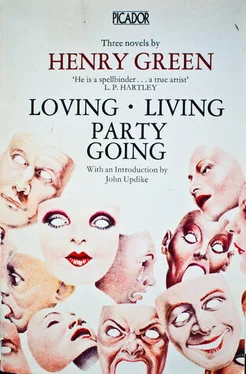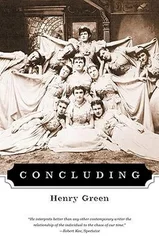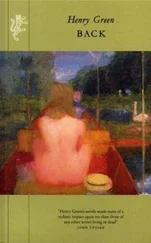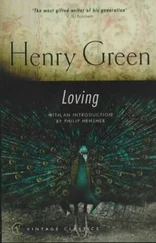Henry Green - Loving, Living, Party Going
Здесь есть возможность читать онлайн «Henry Green - Loving, Living, Party Going» весь текст электронной книги совершенно бесплатно (целиком полную версию без сокращений). В некоторых случаях можно слушать аудио, скачать через торрент в формате fb2 и присутствует краткое содержание. Год выпуска: 1982, Издательство: Picador, Жанр: Классическая проза, на английском языке. Описание произведения, (предисловие) а так же отзывы посетителей доступны на портале библиотеки ЛибКат.
- Название:Loving, Living, Party Going
- Автор:
- Издательство:Picador
- Жанр:
- Год:1982
- ISBN:нет данных
- Рейтинг книги:4 / 5. Голосов: 1
-
Избранное:Добавить в избранное
- Отзывы:
-
Ваша оценка:
- 80
- 1
- 2
- 3
- 4
- 5
Loving, Living, Party Going: краткое содержание, описание и аннотация
Предлагаем к чтению аннотацию, описание, краткое содержание или предисловие (зависит от того, что написал сам автор книги «Loving, Living, Party Going»). Если вы не нашли необходимую информацию о книге — напишите в комментариях, мы постараемся отыскать её.
Loving
Living
Party Going
Loving, Living, Party Going — читать онлайн бесплатно полную книгу (весь текст) целиком
Ниже представлен текст книги, разбитый по страницам. Система сохранения места последней прочитанной страницы, позволяет с удобством читать онлайн бесплатно книгу «Loving, Living, Party Going», без необходимости каждый раз заново искать на чём Вы остановились. Поставьте закладку, и сможете в любой момент перейти на страницу, на которой закончили чтение.
Интервал:
Закладка:
Can you tell the difference between Angela and Claire and Julia and Evelyn? Does it matter? Isn’t part of the point that such people are, ironically, just like the ‘masses’ outside on the station concourse: indistinguishable one from another? Does Max prefer Angela to Amabel or Julia to both? In fact, how can he be sure, when they are almost interchangeable? Who is this man with the mysteriously shifting accent who shuttles to and forth between the hotel barred against possible ‘revolution’ and the foggy underworld outside? Why are there two elderly nannies in attendance? What is the function of the dead pigeon and why does Miss Fellowes feel she has to wash it? Does it matter if the viola rather than the violin plays the next few bars?
In view of the abstract nature of these questions, Evelyn Waugh’s literal-minded complaint that he can’t understand why Miss Henderson has been entrusted with the tickets was perhaps even funnier than he intended. At times it seems that the people in Party Going are like characters from a Robbe-Grillet novel, from whom individuality has been withheld as a matter of literary dogma; and yet they do have individual characters, even if what distinguishes them (different amounts of money, different degrees of familiarity and affection for one another) is not profound. The climactic interchange of the book, it seems to me, is between the lovers Max and Amabel, who have been deceiving and avoiding one another throughout the action and continue to do so when face to face. She pulls at her handkerchief, threatening tears; but he ‘hated tears, he never found them genuine’. Never! A few moments later, she ‘made her eyes cloud over’, and we do not know if she is truly sad or not — and neither, perhaps, does she. As real feeling eddies beneath the surface of brilliantly simulated emotion, Green begins to see what dialogue, unmediated by a narrator, can achieve; his interest in this technique was to take him in one of his later novels, Nothing, into a rather austere place, where fewer readers wanted to follow. Here, however, between Max and Amabel, the effects are sublimely minimal; it as though a scene from Private Lives has been revised by Samuel Beckett.
Party Going is not as easy to love as Living is, but it is impossible not to admire its artistry. Of these three novels, Loving (1945) is perhaps the most immediately sympathetic to a contemporary reader. We are in the aristocratic setting of Party Going, but it is the servant class of Living who are the main characters in a largely below-stairs comedy of life in an Irish country house during the Second World War. The erotic manoeuvrings and duplicity of the servants are given to us with some of the stylistic quirks of Living — the ellipsis, the omissions of articles and so on — though here this quirky grammar serves to depict not a factory but a mansion of closed rooms and quiet corridors where people are often surprised by the unheard approach of others; stables where an idiot lampman lies asleep; and gardens where the damp air is rent by the screech of peacocks.
Another distinctive feature of Loving is that, in a quiet way, a great deal happens. In Romancing, his admirably concise, no-nonsense biography of Green, Jeremy Treglown’s summary of the action runs over three pages. I also feel that the main characters in Loving are more fully developed psychologically than Bert, Lily, Craigan, or young Dupret in Living, or than any of the party-goers. Green still offers little in the way of ‘back-story’ and retains a distrust of ‘motivation’, but somehow we do become familiar with the nature of Charley Raunce, the venal, nervous head footman, surprisingly promoted to butler, and of Edith, the ravishing, gentle but conniving underhousemaid.
Green clearly loves this girl, and we can forgive him for doing so. The delicacy of her nature is beautifully given, in her consolation of the old head housemaid Miss Burch, in the modesty of her blushes, in the sensitivity that causes her to shriek then faint at the sight of a trapped mouse (though her faintness is perhaps also caused by the hysteria of her suppressed desire for Raunce) and in the natural and loving way that she plays with her employer’s granddaughters, Miss Moira and Miss Evelyn. Indeed, the game of blind-man’s buff between Edith and the children in an abandoned room of the old castle is one of the great lyrical scenes of the novel; others include Edith dancing with her fellow-housemaid Kate beneath the broken light of the chandelier in the deserted ballroom, ‘the two girls, minute in purple, dancing, multiplied to eternity in those trembling pears of glass’; and the lamp-man asleep in the straw, beneath a cobweb in the sun, when ‘it might have been almost that O’Conor’s dreams were held by the gold binding his head beneath a vaulted roof on which the floor of cobbles reflected an old king’s molten treasure from the bog’.
I have perhaps already quoted too much from the riches that await the reader. I would like to end by emphasising that these pleasures are not of the same kind as those provided by other novelists. This writer is unique. No fiction has ever thrilled me as the great moments in Living and Loving; I have been moved by Tolstoy, Lawrence, Proust and others, perhaps more so, but not in the same way. Interviewing him once, the American Terry Southern, while ostensibly writing about a number of internal inconsistencies in Green’s plots, described this singular quality quite well, I think:
The reader does not simply forget that there is an author behind the words, but because of some annoyance over a seeming ‘discrepancy’ in the story must, in fact,
remind
himself that there is one. This reminding is accompanied by an irritation with the author for these apparent oversights on his part, and his ‘failings’ to see the particular
significance
of certain happenings. The irritation gives way then to a feeling of pleasure and superiority in that he, the reader, sees
more
in the situation than the author does — so that all of this now belongs to
him.
And the author is dismissed, even perhaps with a slight contempt — and only the work remains, alone now with this reader who has to take over. Thus, in the spell of his own imagination the characters and story
come alive
in an almost incredible way, quite beyond anything achieved by conventional methods of writing.
Henry Green’s writing life was sadly short. He drank too much, worried about money and found the effort of producing these complex, touching works of art too much to contemplate after middle age. He wrote an early memoir called Pack My Bag, published in 1940, when he was only thirty-five. In a passage that begins as no more than a reflection on the memoirist’s difficulty in using the real names of people he has known, he goes on to talk about what writing is, or should be. His definition is one that I — and, I expect, many other admirers — have long had pinned above the desk:
Prose is not to be read aloud but to oneself alone at night, and it is not quick as poetry but rather a gathering web of insinuations … Prose should be a long intimacy between strangers with no direct appeal to what both may have known. It should slowly appeal to feelings unexpressed, it should in the end draw tears out of the stone …
Sebastian Faulks, 2005
Loving
Once upon a day an old butler called Eldon lay dying in his room attended by the head housemaid, Miss Agatha Burch. From time to time the other servants separately or in chorus gave expression to proper sentiments and then went on with what they had been doing.
Читать дальшеИнтервал:
Закладка:
Похожие книги на «Loving, Living, Party Going»
Представляем Вашему вниманию похожие книги на «Loving, Living, Party Going» списком для выбора. Мы отобрали схожую по названию и смыслу литературу в надежде предоставить читателям больше вариантов отыскать новые, интересные, ещё непрочитанные произведения.
Обсуждение, отзывы о книге «Loving, Living, Party Going» и просто собственные мнения читателей. Оставьте ваши комментарии, напишите, что Вы думаете о произведении, его смысле или главных героях. Укажите что конкретно понравилось, а что нет, и почему Вы так считаете.












